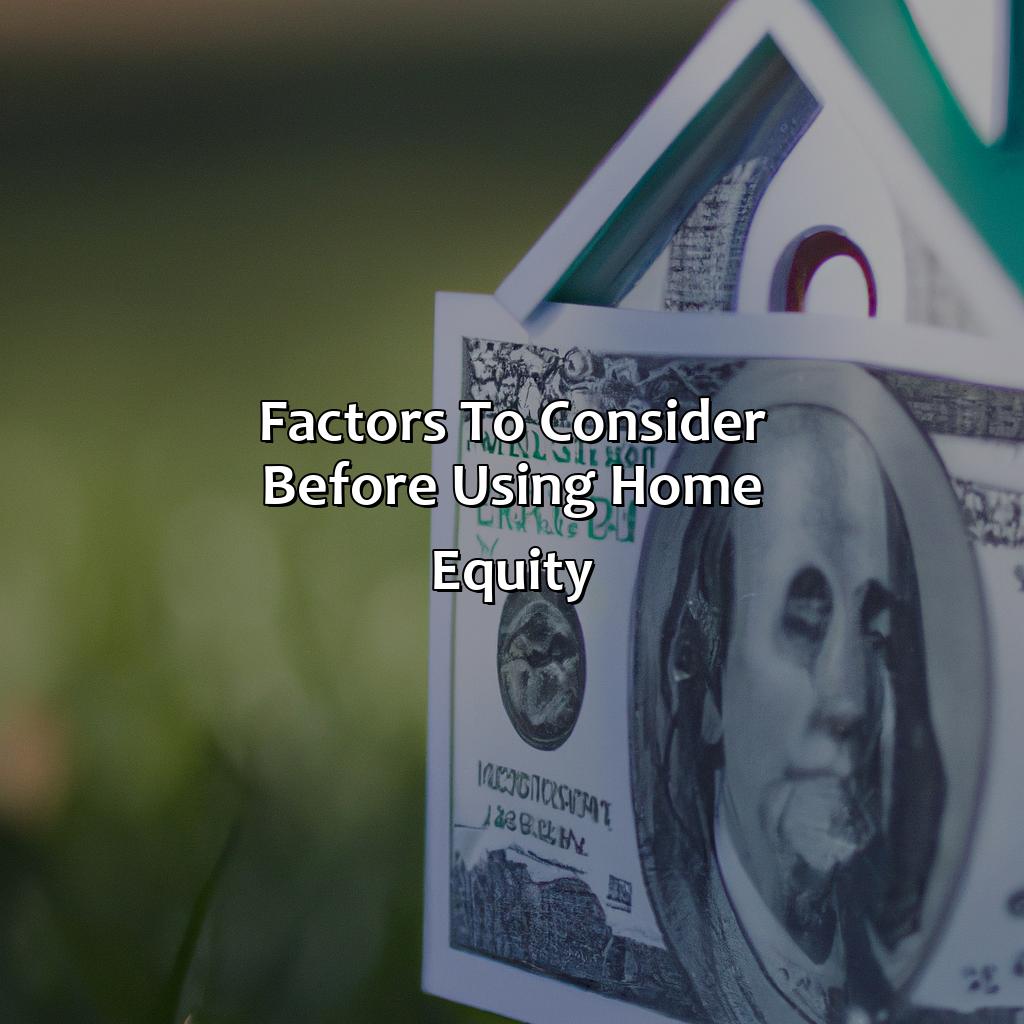How To Use Home Equity In Retirement?
Key Takeaway:
- Home equity can be a valuable source of retirement income: Using home equity in retirement can provide much-needed income to supplement retirement savings, making it possible to maintain a comfortable standard of living throughout retirement.
- There are several ways to access home equity in retirement: Homeowners can choose from a home equity loan, a home equity line of credit (HELOC), or a reverse mortgage. Each option has its own advantages and disadvantages, so it’s important to carefully consider which option is best for your financial situation and goals.
- Factors to consider before accessing home equity include interest rates and fees, long-term financial goals, and existing mortgage or debt. It’s important to think about the potential risks and benefits of each option and to make an informed decision that aligns with your retirement plans.
You need to plan wisely to ensure a comfortable retirement. With home equity, you can leverage it to make your retirement dreams a reality. This article explores practical ways to use your equity to secure your future.
Benefits of Using Home Equity in Retirement
Using Home Equity to Secure Your Retirement
Home equity is one of the biggest assets for homeowners and retirees. Leveraging it in retirement can offer financial security and stability. Here are the key benefits of using home equity in retirement:
- Supplement your Retirement Income: Accessing your home equity in retirement enables you to secure a steady stream of income that you can use to cover daily expenses, travel and healthcare costs.
- Reduce Financial Stress: Paying off your debts or bills with home equity frees up cash flow and reduces financial anxiety. This can lead to a better quality of life in retirement.
- Hedge Against Economic Uncertainty: Home equity is often viewed as a safe and stable investment. By tapping into it, you can safeguard your finances from fluctuations in the stock market and other investments.
In addition to the above benefits, using home equity in your retirement enables you to retain your home ownership while enjoying the fruits of your labor. It also allows you to pass on your home to your heirs as an inheritance asset.
Pro Tip: Consult with a financial advisor to determine the best home equity strategy that aligns with your retirement goals and needs. They can help you understand the tax implications, interest rates, and repayment options that come with various home equity products.

Image credits: retiregenz.com by Yuval Duncun
Options for Using Home Equity in Retirement
Using Your Home Equity Wisely during Retirement Years
During the post-retirement years, homeowners have several options to make the most of their home equity. One option is to utilize a reverse mortgage, which provides funds but reduces the equity in the home. Another option is to downsize or sell the home to access the equity and utilize it elsewhere. Homeowners can also opt to take out a home equity loan or line of credit to access the equity while maintaining ownership.
It is crucial to understand the long-term financial implications of using home equity during retirement. Homeowners must consider their income, expenses, and potential medical expenses before making any decisions. Seeking professional financial advice can help homeowners plan appropriately.
One retiree utilized their home equity as an income source by renting out a portion of their home through Airbnb. This approach allowed them to maintain ownership of their home while generating additional income. It is essential to factor in all expenses related to renting out your home, including taxes, maintenance costs, and insurance.

Image credits: retiregenz.com by David Arnold
Factors to Consider Before Using Home Equity
When it comes to using home equity in retirement, there are several factors to keep in mind. One important consideration is your current financial situation and how drawing on home equity can impact your overall retirement plan. Another factor to consider is the amount of equity you have built up in your home and how it can be used to meet your retirement goals. Additionally, it’s important to consider the potential risks and benefits of different strategies for using home equity in retirement.
As you explore your options for using home equity in retirement, it’s important to keep in mind that every individual’s situation is unique. There may be different factors or considerations that come into play depending on your specific circumstances. For example, your age, health, and overall financial outlook can all impact whether using home equity is a good fit for your retirement plan. It’s important to take a holistic approach and consider the full range of factors before making any decisions.
One interesting fact to keep in mind is that using home equity to fund retirement is becoming an increasingly popular strategy among older Americans. In fact, according to a recent study, more than one in three retirees now rely on home equity to supplement their retirement income. This trend underscores the importance of carefully considering all your options and finding a strategy that works best for you. By taking a thoughtful, informed approach, you can make the most of your home equity and ensure a secure retirement.

Image credits: retiregenz.com by Adam Arnold
Five Facts About How to Use Home Equity in Retirement:
- ✅ Home equity can be used to supplement retirement income. (Source: Forbes)
- ✅ Reverse mortgages and home equity lines of credit (HELOCs) are two common ways to tap into home equity in retirement. (Source: Investopedia)
- ✅ Using home equity in retirement requires careful consideration of the risks and benefits. (Source: The Balance)
- ✅ It’s important to consider the impact of using home equity on inheritance for heirs. (Source: CNBC)
- ✅ Working with a financial advisor can help determine the best approach to using home equity in retirement. (Source: Kiplinger)
FAQs about How To Use Home Equity In Retirement?
What is home equity and how can it be used in retirement?
Home equity refers to the difference between the current market value of your home and the amount you still owe on your mortgage. In retirement, you can use your home equity to generate income or as a source of funds to pay for expenses through a variety of options like a reverse mortgage, home equity line of credit, downsizing, or selling your home.
What is a reverse mortgage?
A reverse mortgage is a type of loan that allows homeowners aged 62 or older to borrow money against the equity in their home. The loan is repaid when the borrower moves out of the home, sells the property, or passes away. Reverse mortgage proceeds can be used to supplement retirement income or pay for expenses.
What is a home equity line of credit?
A home equity line of credit (HELOC) is a type of loan that allows homeowners to borrow money against the equity in their home. Unlike a reverse mortgage, a HELOC is repaid monthly and can be reused as long as there is available equity in the home. HELOCs can be used for any purpose, including home improvements, education expenses, or emergencies.
Should I downsize in retirement?
Downsizing in retirement by selling a larger home and buying a smaller one can free up equity to supplement retirement income or pay for expenses. However, downsizing may not be the best option for everyone. Consider the costs of selling and buying a new home, as well as any emotional attachment to your current home.
What are the advantages of using home equity in retirement?
Using home equity in retirement can help supplement retirement income, pay for expenses, and provide greater financial flexibility. It can also allow retirees to remain in their home while still accessing the equity they have built up over time.
Are there any risks to using home equity in retirement?
There are risks associated with using home equity in retirement, such as the potential for increased debt, higher interest rates, and reduced equity in the home. It is important to carefully consider the advantages and disadvantages of different options and to consult with a financial advisor before making any decisions.








